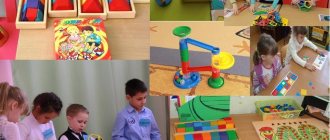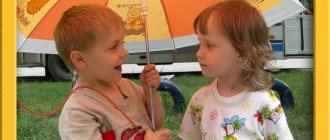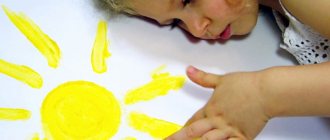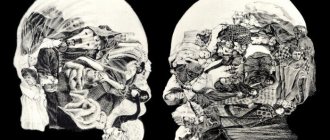Features of the psychological development of a child
As a rule, preschoolers include children aged 4–7 years. Until this moment, the child will have to face the crisis of the age of three. This is a difficult time for the baby and his parents, because the baby behaves poorly, is capricious, and stubborn. The period is characterized by the identification of the child as an independent person whose character, opinion, and views are formed. In order for the crisis to pass as successfully and calmly as possible, adults must show respect and restraint, without belittling their beloved child. He must feel that he is being listened to and understood.
At the end of the crisis, the preschooler becomes one step higher in relations with adults. He feels like a separate unit of society. He needs to be brought up to date with his responsibilities and the rules established in the family. Most children from 3-4 years old go to kindergarten, where they have contact with peers and teachers.
The baby wants to seem more mature than he is. Therefore, he tries to repeat after adults (words, movements, intonation). Some parents are able to observe their own sides in this way and understand what the child can learn from them. The behavior of adults should be indicative. This applies not only to the behavior of family members. Children often bring to life what they see on TV. You should be attentive to what cartoons and films your child watches.
Critical age of three years
A three-year-old child actively resists adults.
He emphasizes his independence and his property. It's time to rebel with your parents. The only child in the family can become tyrannical. He tries in every way to subjugate adults and demands strict fulfillment of his desires. This period is characterized by a breakdown in the relationship between the baby and parents. Signs of separation of children from adults are self-will, stubbornness, negativism, obstinacy and devaluation of adults. All these signs indicate that the baby wants to show his individuality. He is already aware of his desires and shares them with the desires of adults. The baby tries to imitate adults who act on their own. He also wants to realize his desires. At this stage, his speech is actively being formed.
Read more: How to apologize to your best friend?
Psychologist Dmitry Karpachev about the peculiarities of three years of age in the video:
Role-playing games and new education
The psychology of a preschooler is at an early stage. He begins to show interest in the world around him and asks many questions. Development affects memory, mind, neuropsychic side, hidden talents. If parents were able to understand the peculiarities of the child’s mental development, then they will be able to establish harmony in the family and raise the child correctly.
The child learns social norms of behavior in a playful way and establishes contact with others. He wants to distance himself from adults, creates a situation in his head in which he acts as the master of what is happening. However, in real life, he is not able to fully participate in adult life, which is explained by insufficient mental, mental, and physical development. To feel his importance, the child resorts to role-playing game, in which he builds a certain plot and conditions:
- repeats after adults;
- imagines a situation in which toys act as real things;
- reality is inherently symbolic;
- The game requires compliance with established rules and prohibitions.
This state of affairs promotes psychological health, emotional and intellectual development.
There are several psychological characteristics that are characteristic of preschool children:
- ability to solve problems figuratively;
- intentional use of mental processes, the ability to manage, control the reaction to the surrounding situation, the ability to evaluate and predict it;
- formation of self-esteem;
- active development of the speech apparatus;
- conscious perception of established behavioral and social norms;
- preparedness for the educational process at school at the psychological level.
By the age of 7, the presence of certain neoplasms can be noticed to a greater or lesser extent.
Development conditions
Personality development is a complex process that follows certain patterns, but at the same time occurs individually. Therefore, the task of parents is quite difficult - to help the child find his own path, but not to impose his aspirations and interests on him.
At 3–4 years old, the child enters a new period for him, begins to attend kindergarten, and now not only parents, but also teachers take part in his upbringing. Moreover, if the baby was not prepared for such a change in a timely manner, he will experience the so-called “three-year crisis,” which a huge number of children go through.
Once among his peers, the baby will find himself in a new environment. In this period, it is customary to distinguish three stages:
- Adaptation. Simply put, getting used to new behavior and daily routines.
- Personalization. Each kid finds something of his own, tries to stand out from among his peers, using either his own achievements or mischief and pampering.
- Integration. The child tries to express his uniqueness, while adults are ready to accept him as such.
Very often, a child imitates both his parents and his peers, the heroes of fairy tales he listened to and cartoons he watched. Due to his age, the child is not yet able to understand many things, so it is important for parents to promptly explain to him the norms of behavior and the need to comply with them.
Problems arising during the mental development of a preschooler
Despite the desire to explore the world, excessive activity, curiosity, difficulties may arise on the path of mental development:
- poorly developed thinking (lack of attentiveness, problems with the perception of educational material);
- personal and emotional difficulties (stress, anxiety, fear, passivity);
- behavioral problems (aggression, secrecy, hostility, anger);
- communication problems (excessive emotionality, feelings of superiority, isolation);
- neurological difficulties (insomnia, constant weakness, laziness).
Possible problems require immediate consideration and search for ways to combat them.
Despite the fact that this may seem serious and have a negative impact on the child, the psyche of children is able to independently adapt and cope with possible difficulties and omissions in the educational process.
Young preschoolers
Little ones at the age of 3–4 years begin to assert themselves. You can often hear from them “I’ll do it myself,” “I know,” “I can do it.” This often leads to children starting to brag and praise themselves and what they do.
At this age, the child’s right hemisphere of the brain is developed, which makes auditory and visual perception more difficult, which, in turn, helps form a picture of what is happening into a single whole.
Fine and gross motor skills are actively developing. Running, warming up your arms and fingers, jumping, and coordination exercises will be beneficial.
Memory is still involuntary: his attention is attracted by bright, intense moments. At the age of 3, the active development of the speech apparatus in younger preschoolers stops, and about 1000 words have already been deposited in the child’s memory, the meaning and meaning of which he understands.
How to help a child develop?
There is a concept called the “zone of proximal development.” It was introduced into psychology by the famous Soviet psychologist L.S. Vygotsky. The zone of actual development is the child’s skills that he performs independently, without the help of adults.
Also, in preschool age, a child actively develops many mental functions, and with the assistance of an adult, he can learn a lot. You just need to do it not FOR him, but TOGETHER with him. What a preschooler can do with the help of an adult, a little later he will be able to do on his own. This is called the zone of proximal development. If you want to teach your child something, do it with him first. In addition, this is how we develop his confidence in his abilities.
We are always in a hurry to get somewhere, and it seems easier and faster to do something for the child. But then we expect that he himself will be able to put away toys, cut out paper and put clothes in the closet.
Children are capital in which you need to invest time and attention, and they will pleasantly surprise you.
Older preschoolers
At 5–6 years old, the behavior and thinking of children differs significantly from younger preschoolers. Understanding and harmony are established between parents and child, it becomes easier to communicate and understand each other. It is at this age that children especially need love, care, and begin to feel affection and love for other people.
It is easier to establish communication with peers, sense leadership qualities in other children, and accept established routines and rules in games. In the eyes of a child, an adult looks like an assistant, a teacher who, in difficult times, is ready to help and solve problems that have arisen.
Creative skills begin to emerge. He understands what kind of music he likes and doesn’t like, and begins to dance, sing, play an instrument, and play sports. Memory is no longer involuntary; one's own desire is manifested in one's actions.
The thinking of an older preschooler is characterized by the following features:
- Egocentrism. The child can analyze what is happening subjectively, without studying the situation from the outside.
- Animism. The child transfers his “I” to surrounding objects, as a result of which the mobile is perceived as animate.
- Syncretism. The baby is able to see the whole in individual elements, but cannot perceive individual details as a whole.
At 5–6 years old, a preschooler can take part in the dialogue of others, delve into the meaning of what is being discussed, and express a reasoned opinion. At this age, the vocabulary expands to 3–4 thousand words.
Children of older preschool age begin to feel guilty before others and responsibility for their actions, and show interest and initiative. Sometimes six-year-old children consciously express a desire to go to school to learn.
Emotionally, the baby shows more firmness and stability. If we talk about mental activity, then the ability to concentrate on certain things, perceive what is said by ear, and navigate the area is noted.
Impulsivity fades into the background, the preschooler tries to think before doing or saying something, and understands what the consequences may be. The older the child is, the more he sees the comedy in what is happening. Fun and laughter can be caused by non-standard colors or shapes of things. Adult preschoolers are more attracted to games in a comic form.
By the age of 6, an individual character is actively formed and manners appear. The baby may hide a bad mood or condition, gets upset if he is praised for no reason or, even worse, for something he has done poorly or not well enough. Thus, he begins to soberly assess what is happening.
Problems of raising preschool children
It is natural that all parents face problems in raising children. Children may not succumb to one or another type of upbringing, may not listen to their parents and act in their own way, which sometimes makes you want to give up. However, in the vast majority of cases, such problems arise due to common mistakes that parents make. Eg:
- Hyperprotection . Excessive care, surrounding the child with hypertrophied attention and parents’ worry about every mistake leads to the development of symbiosis or “interpenetration”. In this case, the relationship between parent and child becomes too close and destroys the latter’s personal qualities and character. This signals the parents’ lack of confidence both in themselves and in the child, about the centralization of his personality as the meaning of his own life.
- Totalitarian authority . Often parents put pressure on their child with multiple demands, a ruthless attitude and uncompromising conditions. For them, the child’s success and society’s opinion of him are more important, while the child’s feelings and desires play a much smaller role. Such children can grow up to be insecure, anxious and suspicious individuals.
- Rejection . Various situations happen in life: divorce, difficult childbirth, violence. Not every parent can cope with problems and not associate their child with bad memories. Rejection is emotional in nature and has dire consequences - a child who is tolerated simply because there is nowhere else to put him, suffers educationally, and receives constant punishment and cruel treatment.
- Indulgence . Hyperprotection is the scourge of modern families, where the interests of all participants depend on the wishes of the child. In such a situation, the ability to sensibly assess the situation and treat both successes and failures adequately is lost. The reason for excessive indulgence is not always a strong love for the baby, but also the unmet needs of the parents themselves.
If there is at least one of the problems described above, it is worth switching from the thought “Why is the child not amenable to education?” to the thought “Why can’t I raise him?” The problem must be solved as quickly as possible and the reasons for its occurrence must be looked for in oneself. And in this case, you should not refuse the help of a psychologist, since the reason may lie very deep.
Share with your friends!
Subscribe to our Yandex.Zen channel or Yandex.Messenger
Emotional side of personality
Children from the age of 5 become more balanced, calm, do not show emotions and have a temper for no reason. This remains in infancy. The child reacts adequately to problems and difficulties, stops dramatizing, and falling into panic fear of the unknown.
The preschooler begins to feel and perceive situations more deeply as his range of emotions expands. Despite his very young age, the baby is able to show sympathy, can be sad with others, and understand that the person is feeling bad.
Building self-esteem
Why is it so important to develop an adequate self-perception in a child from early childhood? Self-esteem largely determines how he will treat himself in the future. It will show whether the child will allow others to treat his own personality with disdain or will still force him to respect his choice. The formation of self-esteem occurs between three and five years. It is at this time that the little person begins to receive evaluation of his actions from an adult. If the actions are characterized as positive and the child is generally praised by the teachers, then he will feel comfortable in society. Otherwise, his constant companion will be an invariable feeling of guilt. Parents should not scold their child too much. Try to avoid unfair criticism, be more delicate.
The psychology of preschool age is such that the child takes everything much more seriously than it actually is. He cannot yet form an independent image of himself without the participation of an adult. To do this, he lacks life experience and basic self-confidence. When we praise a child, it is deposited in his subconscious that he, as a person, is worth something and is valuable in himself. In the case of frequent criticism (especially unfair), our child only becomes isolated and stops trusting the world around him. In other words, self-esteem is determined by how adults treat a child. Let your child know that you are always on his side. A son or daughter should know that there are no unsolvable situations. Show by your own example that you can take advantage of everything.
Self-awareness of a preschooler
By the age of 6, self-awareness is formed, which is achieved through mental activity and character. Self-awareness is considered the main new development of the baby. At first, the preschooler analyzes the actions of others, compares, evaluates actions, moral behavior, and skills.
The child fully understands gender. Along with this, changes in habitual behavior occur.
The preschooler begins to become aware of himself in different times. Remembering moments from the past and dreaming about something in the future.
Self-esteem is equally important. Self-knowledge is built on the basis of the relationship of parents to the baby. The main thing is that mom and dad show support in any endeavors and are true friends for the children. It is worth talking with children more often on a friendly note, asking for their opinion, and asking for advice. The baby will learn to express his opinion openly and will not be afraid of it.










